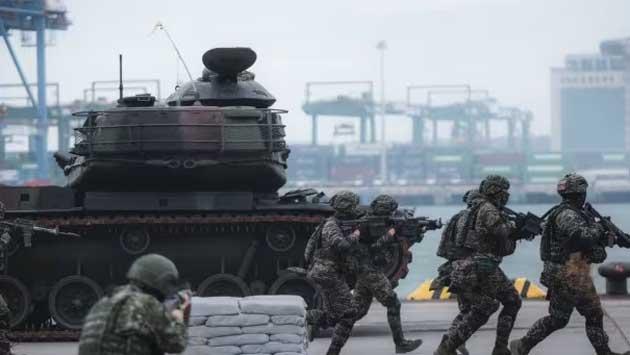Reply To:
Name - Reply Comment
 Chinese media had initially welcomed the selection of the ‘moderate’ Shigeru Ishiba as Japan’s new prime minister, but the optimism was short-lived. Within hours of his appointment, Japan sent its warship, the *Sazanami*, through the Taiwan Strait for the first time, signaling a significant shift in Tokyo’s military posture.
Chinese media had initially welcomed the selection of the ‘moderate’ Shigeru Ishiba as Japan’s new prime minister, but the optimism was short-lived. Within hours of his appointment, Japan sent its warship, the *Sazanami*, through the Taiwan Strait for the first time, signaling a significant shift in Tokyo’s military posture.
Japan has since made it clear that it will respond to Chinese military aggression with similar measures. As a result, Sino-Japanese relations are expected to deteriorate further, with Japan set to continue developing strategies aimed at countering Chinese assertiveness and expansionism in the region.
Ishiba has been perceived as a moderate in China, primarily due to his focus on defence dialogue and communication. However, with growing Chinese military aggression, he is likely to follow in the footsteps of his predecessor, Fumio Kishida, who made military policy changes aimed at strengthening Japan's defensive capabilities. Japan, which would not have confronted China head-on a few years ago, is now revising its national defense policy, preparing to challenge China’s growing military influence.
The Chinese government reacted sharply to Japan’s recent action. Chinese Foreign Ministry spokesman Lin Jian warned that Japan had crossed a “red line” with the *Sazanami’s* passage through the Taiwan Strait. Just days earlier, China had sent its aircraft carrier *Liaoning* and two destroyers through Japanese maritime zones en route to the Pacific Ocean. This raised concerns in Japan that a failure to respond would only embolden Beijing in its regional assertiveness.
Japan has experienced several incursions by Chinese naval ships, aircraft, and spy planes into its territory, which Tokyo has labeled as “utterly unacceptable” threats to its sovereignty and national security. According to Masashi Murano, a senior fellow at the Hudson Institute in Washington, Japan’s transit through the Taiwan Strait was a “clear deterrent signal.” He added that failure to act would have been interpreted by China as tacit permission to escalate its activities further.
In response to China's growing military activities in the region, Japanese Chief Cabinet Secretary Yoshimasa Hayashi stated, “The government has a strong sense of crisis regarding China's military trends, including a series of incursions into our airspace and territorial waters in a short period of time.” Japan has vowed to take all possible measures to protect its interests.
Japan’s move also aligns with the growing international support for ‘freedom of navigation’ and the ‘rule-based international order.’ International relations expert Bec Strating pointed out that Japan’s action is part of a broader pattern of nations—both in and beyond Asia—stepping up their naval presence to counter China’s maritime claims.
While Chinese President Xi Jinping congratulated Ishiba and called for peaceful coexistence between the two nations, tensions persist. Xi urged Japan to "follow the path of peaceful coexistence, friendship for all generations," but Japan remains wary of China’s intentions, particularly in light of the ongoing tensions over Taiwan. Beijing has since expressed its “heightened vigilance” regarding Japan’s political actions, particularly in the Taiwan Strait.
Taiwan is set to remain a point of contention, further complicating the prospect of Sino-Japanese reconciliation. Ishiba’s visit to Taiwan in August was met with strong disapproval from Beijing, with Chinese Foreign Ministry spokesman Lin Jian stating that Beijing would closely monitor Ishiba’s policy towards China, despite Chinese state-run media like *Global Times* calling his policies more balanced and moderate.
Having previously served as Japan’s defence minister, Ishiba is deeply involved in security affairs and has consistently advocated for a robust Japanese military. Michael Cucek, an expert in Japanese politics at Tokyo’s Temple University, noted that Ishiba is “a defence wonk,” and that his leadership is likely to see a stronger military stance from Japan in East Asia. Cucek added, “He has always been an advocate for a more robust Japanese military, and that’s the direction Japan is heading toward.”
Furthermore, Ishiba has been pushing for the creation of an ‘Asia NATO’ to counter China’s influence. He likened the situation in Asia to the conflict in Ukraine, stating, “Replacing Russia with China and Ukraine with Taiwan, the absence of a collective self-defense system like NATO in Asia means that wars are likely to break out because there is no obligation for mutual defense.” This statement highlights a key shift in Japanese strategy, where Tokyo sees the need for greater collective security measures in the region.
Misato Matsuoka, an associate professor at Teikyo University, warned that growing Chinese aggression and Japan’s responses “risk heightening military tensions in the region, making diplomatic resolution more challenging.” As Sino-Japanese tensions continue to escalate, the prospects for a peaceful resolution appear increasingly difficult.